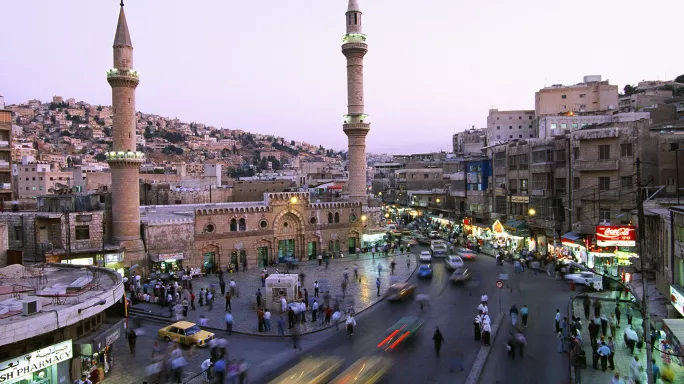As a country, Jordan is surrounded by wars, extremism and violence. The Syrian refugee crisis is one of the biggest challenges that we’ve faced, and it’s affected the educational system so much. It’s led to overcrowding schools, with some classrooms reaching 60 to 70 students, which of course can leave teachers frustrated, stressed and overworked.
But in these times, we all work together to make things as easy as possible. My team of teachers is passionate and committed, and our local community does much to support our school.
My teaching day starts in the school yard where pupils take part in sport exercises under the supervision of the PE teacher. This is followed by a raising of the national Jordanian flag while all students repeat the national anthem - as principal, I take great pride in watching this every day, it really is a beautiful moment.
On their way to class, pupils listen to the school radio which gives them all sorts of information, from the latest news to a poem that one of their classmates has written.
At our school, Shajra Aldr in Jordan’s capital, Amman, we have 700 students aged between 5 and 12, 15 per cent of which are different nationalities.
The school day starts at 8am and ends at approximately 1.30pm with a break in the middle of the school for 20 minutes. Once the school day ends, I reflect on the practices and attitudes throughout the school and make a plan for the following day. I supervise the students, teachers and do my best to keep the school environment healthy as much as I can, in addition to holding meetings with parents.
In May, we had the minister of education, Dr Omar Razzaz, visit our school to check on our learning process, and to learn more about the school’s needs. From this visit, we received a financial grant for maintenance work in addition to the rehabilitation and modernisation of some of the old buildings. Just one month after his visit, Dr Razzaz became prime minister of Jordan.
In Jordan, we have a huge lack of facilities and equipment in laboratories, workshops and infrastructure and are suffering from a shortage of administrative staff. But that doesn’t stop teachers and principals making a difference through the development and implementation of initiatives, activities and methods and strategies.
One of the most memorable moments for me was when we introduced an initiative which promoted students’ thinking and behaviour - pupils won prizes that were contributed by the local community.
Personally, I also spent a lot of time contacting educational institutions from around Jordan to help them to implement courses and programmes that develop the performance of teachers professionally and have a positive impact on improving the students’ behaviour and achievements. My school offers a variety of activities for students to meet their needs, interests and direct their energies to positive aspect; as a result, the school and students have won many competitions nationally and internationally.
Although there are various challenges facing education in Jordan, especially in the development of teachers’ competencies, there are institutions that support teacher education such as the Queen Rania Academy, where many programmes have been implemented and offer diploma certificates for developed pre-service and in-service teachers. I hope that with the introduction of these places, the quality of teaching - and therefore pupil learning - across the country will increase.
Sahar Fayyad is the principal at Shajra Aldr school, Amman, Jordan
Do you want to tell the world’s teachers about your working day, the unique circumstances in which you teach or the brilliance of your class? If so, email kate.parker@tesglobal.com. We will give your school £100 if your story is published.

